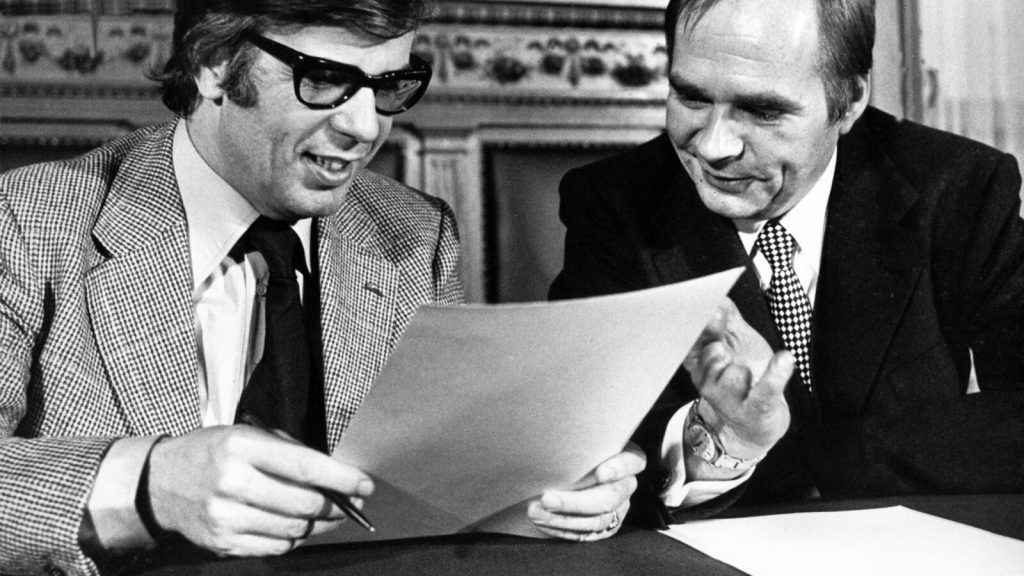CLEVELAND — Christoph von Dohnányi, a conductor acclaimed for performances as music director of the Cleveland Orchestra from 1984 to 2002, has died at age 95.
Dohnányi died in Munich on Saturday, the Cleveland Orchestra said in a statement Monday.
“A grand seigneur among the great international conductors to whom the Salzburg Festival owes its world reputation,” Salzburg Festival artistic director Markus Hinterhäuser said in statement.
Dohnányi was most known for his time in Cleveland, helping burnish an orchestra led by George Szell from 1946 to 1970 and Lorin Maazel from 1972 to 1982.
“It’s an ensemble of musicians who come somehow from making chamber music,” Dohnányi said in a 2011 interview for the Cleveland Orchestra Musicians. “The real, very special (characteristic) about the Cleveland Orchestra is that people, musicians, are used to listen to each other very much. All orchestra should do it, many do it, but very few do it to the extent the Cleveland Orchestra is able to do it.”
Showing remarkable stability, the orchestra has been led since his departure by Franz Welser-Möst, who plans to leave in 2027.
Dohnányi was born in Berlin on Sept. 8, 1929, a son of lawyer Hans von Dohnanyi and Christine Bonhoeffer, sister of the pastor Dietrich Bonhoeffer and grandson of the Hungarian composer Ernst von Dohnányi.
“His storied family history gave him a unique musical perspective,” Cleveland Orchestra CEO André Gremillet said in statement. “Maestro Dohnányi’s artistry and dedication led to a deep mutual respect with our musicians, which was felt sincerely by our audiences.”
Hans von Dohnanyi and Bonhoeffer were arrested by Germany’s Nazi government in 1943 and executed two years later, according to a timeline Christoph von Dohnányi helped prepare for the Cleveland Orchestra.
Christoph von Dohnányi initially studied law for two years after World War II, then attended Munich’s Musikhochschule to study piano, composition and conducting and coached at the Bavarian State Opera. He studied with his grandfather at Florida State in 1952-53, then at the Boston Symphony Orchestra’s Tanglewood Music Center.
He worked at the Frankfurt Opera as a repetiteur and conductor under Georg Solti starting in 1953 and became general music director at the Lübeck Opera from 1957 to 1963. He made his U.S. debut with the St. Louis Symphony Orchestra in 1961. Dohnányi moved on to become general music director of the Staatstheater Kassell from 1963 to 1966 and chief conductor of the WDR Symphony Orchestra in Cologne from 1964 to 1970.
Dohnányi followed Solti at Oper Frankfurt from 1968 to 1977 and was music director of the Hamburg State Opera from 1977 to 1984; his brother Klaus was Hamburg’s mayor from 1981 to 1988.
He later served as principal guest conductor of London’s Philharmonia Orchestra from 1997 to 2008 and chief conductor of Hamburg’s NDR Sinfonieorchester from 2004 to 2010.
Dohnányi made his Vienna Philharmonic debut at the 1966 Salzburg Festival and conducted the orchestra through 2019.
“We will remember his artistic work with sincere appreciation. Our thoughts are with his family,” Vienna Philharmonic chairman Daniel Froschauer said in a statement.
Dohnányi made 77 appearances at the Salzburg Festival from 1962 through 2014, leading the world premiere of Hans Werner Henze’s “Die Bassariden” in 1966. He made his Metropolitan Opera debut leading Verdi’s “Falstaff” in 1972 and conducted at the Vienna State Opera from 1972 to 2001, primarily Wagner and Strauss but also Berg, Friedrich Cerha’s “Baal” and the world premiere of Gottfried von Einem’s’s “Kabale und Liebe.”
Dohnanyi’s marriages to actress Renate Zillessen and soprano Anja Silja ended in divorce. He is survived by his third wife, Barbara Koller, a violinist and arts manager; brother Klaus; two children from his first marriage, Katja and Justus, and three from his second, Julia, Benedikt and Olga.


